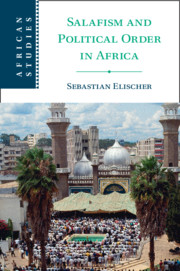
Salafism and Political Order in Africa
-
- Published online:
- 06 August 2021
- Print publication:
- 05 August 2021
4 - The State as Demobilizer of Activist Salafism
-
- Book:
- Salafism and Political Order in Africa
- Published online:
- 06 August 2021
- Print publication:
- 05 August 2021, pp 98-123
-
- Chapter
- Export citation
5 - The State as Enabler and Radicalizer of Activist Salafism
-
- Book:
- Salafism and Political Order in Africa
- Published online:
- 06 August 2021
- Print publication:
- 05 August 2021, pp 124-162
-
- Chapter
- Export citation
7 - Autocratic Legacies, the State, and Salafism in Africa
-
- Book:
- Salafism and Political Order in Africa
- Published online:
- 06 August 2021
- Print publication:
- 05 August 2021, pp 188-226
-
- Chapter
- Export citation
3 - Missed Opportunities and the Formation of Islamic Federations
-
- Book:
- Salafism and Political Order in Africa
- Published online:
- 06 August 2021
- Print publication:
- 05 August 2021, pp 74-97
-
- Chapter
- Export citation
Conclusion
-
- Book:
- Salafism and Political Order in Africa
- Published online:
- 06 August 2021
- Print publication:
- 05 August 2021, pp 227-236
-
- Chapter
- Export citation
1 - Concepts, Cases, and Variation
-
- Book:
- Salafism and Political Order in Africa
- Published online:
- 06 August 2021
- Print publication:
- 05 August 2021, pp 21-48
-
- Chapter
- Export citation
2 - Critical Junctures and the Formation of State-Led National Islamic Associations
-
- Book:
- Salafism and Political Order in Africa
- Published online:
- 06 August 2021
- Print publication:
- 05 August 2021, pp 49-73
-
- Chapter
- Export citation


